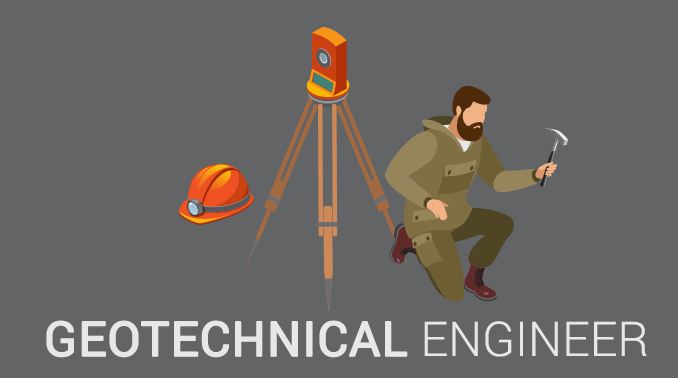Unknown Facts About Geotheta
Unknown Facts About Geotheta
Blog Article
5 Simple Techniques For Geotheta
Table of ContentsExamine This Report about GeothetaOur Geotheta StatementsThe Single Strategy To Use For GeothetaTop Guidelines Of GeothetaGeotheta Fundamentals Explained

With experience and a tested record, you can proceed to senior design functions, task management settings, or perhaps start your very own consultancy. Constant professional development and remaining current with the most recent industry fads and innovations are essential for career development in this vibrant area. A career in geotechnical design supplies a varied variety of jobs and challenges, ensuring that no 2 days are the exact same.
In the workplace, you will certainly examine information, prepare reports, and work together with other specialists - https://slides.com/geotheta. Fieldwork involves website brows through, gathering soil samples, performing geotechnical examinations, and overseeing building and construction tasks. Depending on the project, you may work on-site in varying climate condition and take a trip to various locations within the UK. As a geotechnical designer, your jobs might consist of website characterization, incline stablizing style, foundation design, soil enhancement methods, and geotechnical instrumentation and monitoring.
Geotheta - An Overview
You will certainly likewise interact with customers, contractors, and governing authorities to address any kind of problems and make sure conformity with industry criteria and guidelines. Geotechnical engineering can be difficult, as it includes handling complex soil conditions and resolving potential threats to human life and infrastructure. Efficiently resolving geotechnical issues and adding to the growth of secure and sustainable structures can be greatly gratifying.
If you're taking into consideration a career in geotechnical design, below are some valuable suggestions to assist you accomplish success: Networking is critical for profession advancement in any area, and geotechnical engineering is no exception. Signing up with expert associations, such as the Organization of Civil Designers (ICE) and the British Geotechnical Organization (BGA), can provide networking opportunities, accessibility to market events and seminars, and valuable resources for professional growth.

Creating strong interpersonal and management abilities will establish you apart and open doors to job development possibilities - https://profile.hatena.ne.jp/geotheta/. Embarking on a job as a geotechnical designer in the UK uses exciting leads and the chance to contribute to the development of the built environment. By following the instructional paths, obtaining required licenses and qualifications, and continuously honing your abilities, you can develop an effective career in this dynamic field
The Greatest Guide To Geotheta
When a person asks what I do and I inform them that I am a geotechnical designer, I typically obtain the follow-up concern of, "What is that?" Geotechnical design is a customized branch of civil design that deals with the scientific research of the technicians of dirt and rock and its applications.
In this short article, I will certainly review the function of geotechnical engineering and the sorts of issues geotechnical engineers address. Geotechnical engineers (geotechs) are associated with almost every sort of civil design project. Every structure is sustained by dirt or rock unless it is drifting, flying, or falling down.
Geotechs are usually most included at the start of a job. Several of the tasks that a geotech might be accountable for are investigating subsurface conditions, establishing required laboratory testing of dirt and rock, analyzing the subsurface exploration results, and writing reports that document the site conditions and offer suggestions for foundations, fill specifications, incline stability, and so on.
Usually, people do not wish to pay for geotechnical records or design on smaller jobs, but the price of an expert is generally more affordable than spending for substantial structure repair services in the future. Geotechs are associated with the design of freeway cuts and fills up, shallow and deep foundations, earth retaining structures, embankments, tunnels, garbage dumps, dams, incline stablizing systems, and sidewalk subgrades.
Geotheta - An Overview

Often, points that may not appear vital become vital years later on when issues occur. Geo Tech Engineer. One last point to keep in mind: geotechnical design is married to geology. Regardless of how excellent your engineering know-how is, if something important is missed out on in the geologic characterization at a site, your know-how might not conserve you
Vance, P.E., graduated from Marshall University with a Bachelor's Degree in Design and received a Master of Scientific Research in Civil Engineering from the University of Illinois at Urbana-Champaign. He is currently pursuing a Ph. D. in Geological Design at Missouri College of Scientific Research and Technology. Jese functions as a geotechnical designer who focuses on geohazards.
The Ultimate Guide To Geotheta
Jese lives in West see this page Virginia with his other half and kid. He delights in creeping about on any kind of landslide he can locate and hanging around fly angling on the water. He can be found on LinkedIn. I hope you enjoyed this week's post by visitor writer Jese Vance. If you want your company possibly joining the Civil Engineering Collective, please contact us below or call us at 800-920-4007.
Anthony Fasano, P.E.Engineering Management Institute Writer of Designer YourOwn Success. Civil engineering is the professional engineering technique that manages the style, construction and upkeep of public and private framework within the natural setting. Geotechnical design is a technique within civil engineering that focuses on the actions of natural geological products in engineered systems. Geotechnical engineers identify that dirt and rock are the least expensive and most abundant building materials on Planet, and consequently play a significant role in the construction and efficiency of every kind of civil engineering framework.
Report this page